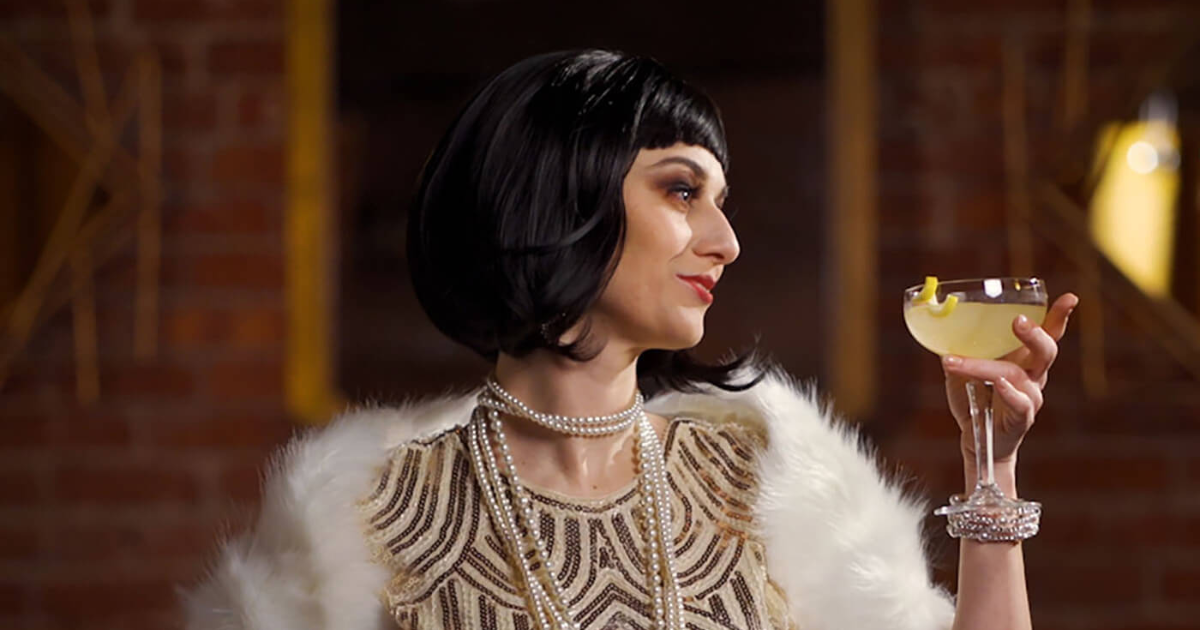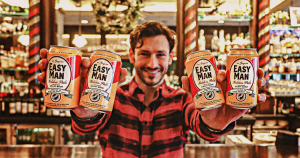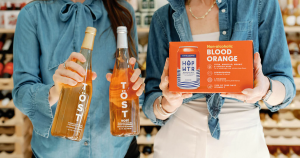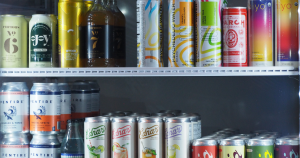Rebecca Styn has always been drawn to the art of bringing people together through shared experiences. After co-founding Room 33, a prohibition-inspired speakeasy, Rebecca saw an opportunity to blend her love for hospitality with the growing demand for non-alcoholic beverages.
Enter Blind Tiger, a brand designed to offer complexity and sophistication without the booze. In this interview, Rebecca opens up about her path from opening a bar to launching her brand, the challenges of creating beverages inspired by classic cocktails, and her vision for the future of the non-alcoholic beverage category.
Dry Atlas: You’ve had quite a journey from founding Room 33 to creating Blind Tiger. Can you tell us about that transition?
Rebecca Styn: Absolutely! My husband and I opened Room 33 on New Year’s Eve in 2017, which coincidentally was also our wedding anniversary. We both ran for local office with a shared passion for revitalizing our downtown, so we put our money where our mouth was—and that’s how Room 33 was born.
As time passed, I began noticing a lack of sophisticated non-alcoholic options, especially as I was starting to drink less myself. Room 33 had built a reputation for craft cocktails, but when COVID hit and takeout-only rules banned alcohol to-go, our main revenue stream vanished—so we pivoted fast, bottling non-alcoholic cocktails to stay afloat. The response was overwhelming, and that’s how Blind Tiger was born. I realized I could bring these drinks to a larger market, so I navigated through the process, and here we are today.
DA: What inspired the name “Blind Tiger” for your brand?
RS: The name Blind Tiger has roots in the Prohibition era. Back then, it was a discreet way to refer to hidden bars where alcohol was served illegally. The story goes that people would “pay to see a wild animal”—a so-called blind tiger—but that they would get a drink for free. It was a creative way to skirt the laws of the time.
We were inspired by the idea of bringing people together, just like the speakeasies did in the past, but in a modern, inclusive way. The name felt fitting, and I wanted it to reflect both the history of alcohol prohibition and the excitement of something rebellious and hidden, yet welcoming.
DA: As a founder with a PhD in leadership, how has your academic background influenced how you approached Blind Tiger?
RS: My PhD focused on entrepreneurial leadership, particularly behavioral leadership. I’ve always been fascinated by what makes people not just follow, but believe in leaders.
With Blind Tiger, I set out to build more than a brand—I wanted to create a culture rooted in inclusivity and empowerment. I adopted a coaching mindset because I believe the best leaders don’t hoard talent—they help it grow. When someone on my team finds an opportunity that lights them up—even if it takes them beyond our walls—I encourage them to chase it. This approach, along with my experiences from Room 33, has shaped how I navigate the beverage industry, which is incredibly competitive. It’s all about being authentic and staying true to your brand.
DA: Blind Tiger is known for creating beverages inspired by classic cocktails. What were some of the challenges in recreating these drinks without alcohol?
RS: Early on, we faced a lot of challenges, particularly with the limited ingredients available. At the time, there wasn’t much innovation in the non-alcoholic space, so we had to get creative. For example, we used juniper instead of gin and relied on natural flavors rather than artificial additives.
One of the biggest challenges was balancing the sweetness. While it’s easier to replicate flavors with sugar, I didn’t want to use refined sugars. We opted for natural sugars—cane sugar, honey, and monk fruit—which was a huge decision for us. The key was finding a balance that maintained the complexity and richness of traditional cocktails without relying on artificial ingredients.
DA: What sets Blind Tiger apart from other non-alcoholic options on the market?
RS: Our goal was always to create something that’s both sophisticated and inclusive. Unlike some of the overly sweet mocktails out there, we wanted to bring complexity and depth to the drinks. We also stay away from artificial ingredients. I think the inclusivity of our brand is key, and that’s reflected in both the taste and the design. Whether you choose to drink alcohol or not, we want our beverages to be something everyone can enjoy.
DA: As Blind Tiger expands, you’ve secured some impressive distribution wins, including Royal Caribbean, Total Wine, and Wegmans. What’s been the key to these successes?
RS: Distribution is always a challenge, but I’ve learned that the most important thing is building strong relationships. When we secured Royal Caribbean, it wasn’t through a formal RFP process; it was about making the right connections. One buyer tasted our product, and within days, we had a deal.
Overall, it’s about being prepared for the opportunity when it arises. Of course, scaling up has its own set of challenges. We started with a small co-manufacturer, but as we grew, we had to be very careful about how we managed production. It’s a balancing act, but I’ve always been committed to quality and authenticity.
DA: How do you see the future of the non-alcoholic beverage category?
RS: The non-alcoholic sector is still in its early days, but it’s definitely here to stay. I believe the future of this category lies in offering more options that appeal to a broad consumer base. People don’t always want to choose between alcohol and no alcohol. They want versatility—products that they can enjoy whether they’re drinking alcohol or not.
DA: What key lessons have you learned throughout your journey as an entrepreneur?
RS: One of the most important lessons is resilience. I’ve failed a lot along the way, but the key is getting back up. Entrepreneurship is tough, and you must be mentally strong to handle the ups and downs (and even when you don’t feel mentally strong you have to fake it). Stay grounded, and remember that success takes time.
You also need grit, and the ability to keep going even when it feels impossible. I advise aspiring founders to embrace the hard moments, stay authentic, and never stop learning. Mental health is just as important as business strategy.
DA: Finally, what advice would you give to aspiring founders looking to create their own brands?
RS: My advice is simple: don’t be afraid to fail, and don’t expect everything to go perfectly. You need to be able to pick yourself up every time you fall. And keep your passion alive—even when things get tough. Entrepreneurship is a journey with its ups and downs, but if you have the grit and determination to keep going, you’ll have a much better chance at succeeding. Be open to learning, and remember, it’s not about being perfect; it’s about perseverance.
This interview has been edited for length and clarity.






